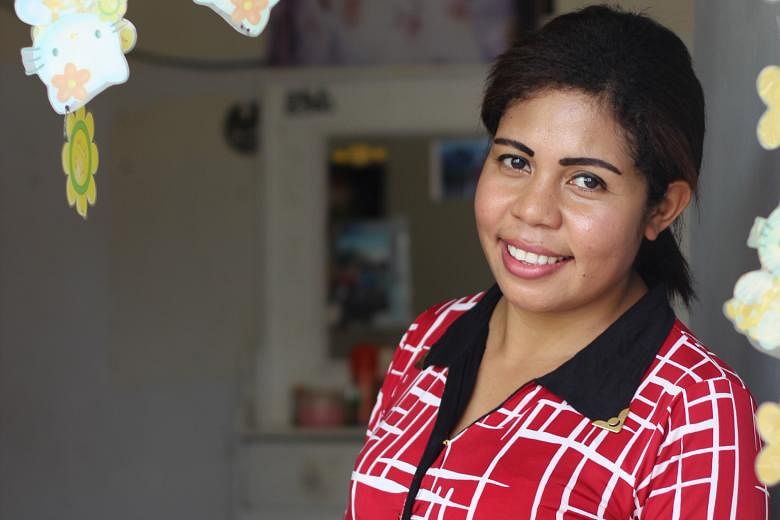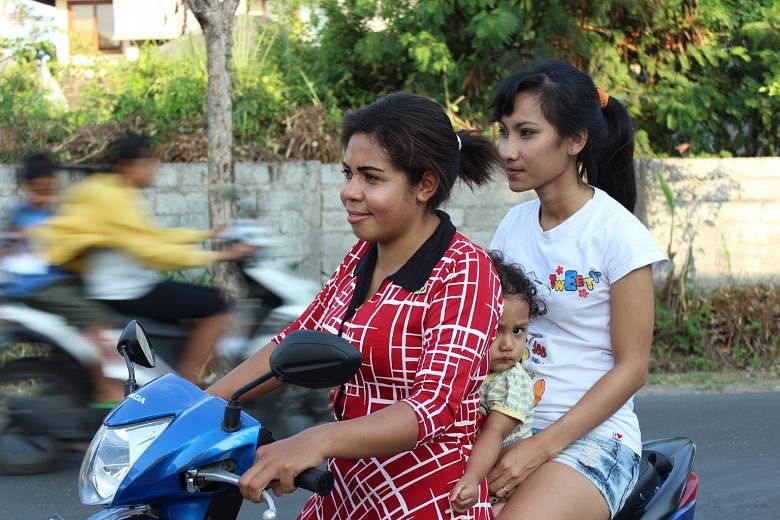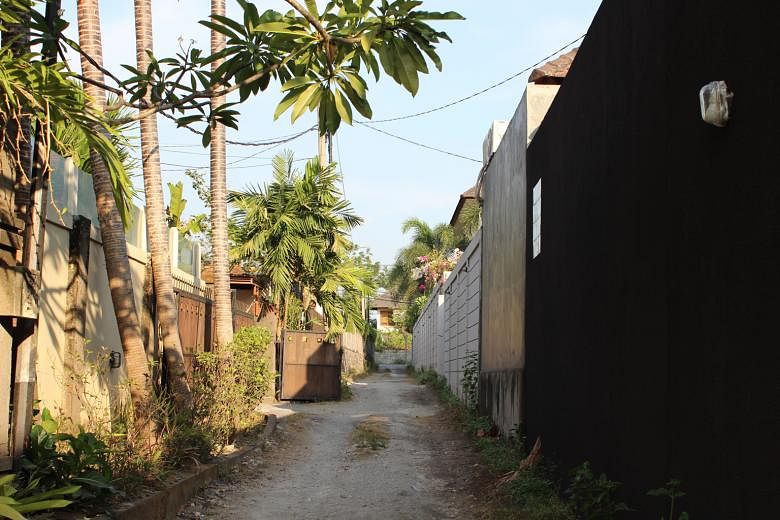As a teenager alone in a foreign country, Indonesian maid Nova Erni Esiana Bones cried almost every day for the first month after arriving in Singapore.
With no mobile phone and no friends, all she could do was to think of home and her parents - the left-behind drivers of a dream.
Seven years later, she is still working as a maid, but in Bali, Indonesia - and she now soothes the cries of her baby girl who cannot bear to lose sight of her.
"I have a family now, a husband and daughter. I'm happy staying with them and working together here (for now)," said Ms Bones, who turned 26 two weeks ago.
Growing up the only daughter with six older brothers, she first heard about Singapore when a neighbour in her village of Oben, in eastern Indonesia, ventured out to work as a maid overseas.
-
JOB AND FAMILY PROFILE
-
NAME: Ms Nova Erni Esiana Bones
AGE: 26
HOMETOWN: Oben, Indonesia
FAMILY: Married to Mr Daly Lifu, 28. They have an 18-month-old daughter, Acha
LIVED IN SINGAPORE: 2008-2012
JOB IN SINGAPORE: Domestic helper
WORK PASS: Work permit
CURRENT PLACE OF RESIDENCE: Bali, Indonesia
CURRENT JOB: Domestic helper
ADVICE TO OTHER MIGRANTS: "Keep working hard because through hard work we can change our lives."
-
Work permit holders make up the bulk of Singapore's foreign workforce. As of June, seven out of 10 foreign workers in the Republic hold work permits.
Of them, 227,100 are domestic workers while 322,400 are in the construction industry.
They are also paid the least: both professions earn between $450 and $650 a month. To make more, they sometimes give up days off to work overtime.
There are around 125,000 Indonesian maids in Singapore, and about 70,000 maids from the Philippines. Construction workers come from countries such as Bangladesh, India, China and Myanmar. The breakdown is not available.
Adequate time for rest has been an issue for some domestic workers. While a weekly rest day has been mandated for them, employers can pay them in lieu of a day off.
For construction workers, their worries here include poor workplace safety, salary arrears as well as inadequate housing and food conditions.
The neighbour returned to regale the girls of the village with stories, plying them with persuasive lines such as "I can improve my life" and "you can go out any time" - which Ms Bones later found to be an exaggeration.
But she was impressed by how the woman had begun to speak English instead of Bahasa Indonesia.
"She was the first one to make a big house. So the girls in my kampung started going overseas to Singapore, Hong Kong and Bali," added Ms Bones, who is now also conversant in English.
Just 18 years old and fresh out of high school, Ms Bones had to go pass an English test, a medical check-up and a mental health check before she could be cleared to work as a maid in Singapore.
Despite the tough initial period, things got better after six months, when she was allowed to have a mobile phone and could contact her family, although she rarely had a day off. Her main task was to look after the employer's elderly mother and accompany her during stays at Tan Tock Seng Hospital.
She also learnt to cook.
Some of her best memories are flavoured - spicy mee siam and savoury glutinous rice, which she learnt to prepare for her employer's church gatherings.
After she finished her first two-year contract, she returned to Kupang, Indonesia - where her parents live, selling bananas and lemons from their family farm - for a two-week holiday.
But her father was warded in hospital due to a bacterial infection of the stomach.
Looking after him, she was struck by the differences between her experience in the hospital there and that in Singapore.
"Nursing in Kupang is not like in Singapore. I want to improve the standard," she said.
After returning to Singapore to complete a second two-year contract with her employers, she returned to Indonesia to start studying for a degree in nursing at Stikes Maranatha Kupang. It was one of the best times of her life.
"I woke up in the morning excited to go to study," she said, recalling her keenness to make new friends and excel because of her language advantage - classes were in a mix of English and Bahasa Indonesia.
She even found a role as a teaching assistant.
But the money ran out after just one semester.
A new house in the village, a cow and the family's first motorcycles were testament to her years abroad, but she had little left of the $230-a-month salary she had earned, especially after her father's bout in hospital.
Although her parents and fourth brother were supportive of her studies, which would cost around 60 million rupiah (S$6,000) over 41/2 years, she did not want to place financial strain on them, especially on her brother who had just got married and was supporting his sister-in-law's studies.
Thus, she made the choice to drop out of the course and go back to work.
Thankfully, with Singapore on her biodata, she was able to find a job as a nanny and housekeeper with Bali-based Australian fashion designers within two weeks of looking.
"I think the interview with me impressed them, because I can speak English and I have experience," she said, of her new employers in Bali, a 1hr 45min flight away from home.
"I like taking care of children and old ladies," she added. "Old ladies are like children, you have to sayang (show affection to) them ."
Before she left for Bali three years ago, she married her childhood friend Daly Lifu, 28, in a ceremony in Kupang, and they moved over together. He found a job as a security guard at a hotel and they welcomed baby Acha 18 months later.
Mr Lifu said, shyly, in Bahasa Indonesia: "I wanted her (Nova) to come back to Indonesia so we can get married and have a family together here."
Ms Bones said, with a laugh, as she helped to translate: "He said he wants us to be married not just now but forever."
Her effervescence appears to have left its mark on those around her. During the short two days Insight spent with her in different Bali neighbourhoods, she bumped into no fewer than five friends.
She sees working as a nanny or housekeeper as one of the more lucrative jobs around, paying around four million rupiah a month, compared with the 1.2 million she earned during stints as a baker and waitress during her pregnancy, which did not leave much after covering the 600,000 rupiah monthly rent for her one-storey, one-room boarding house.
She has sent back to her family 15 million rupiah in the three years she has been working in Bali.
Home for her is in the Canggu area down a narrow dirt lane.
Inside, a wedding photo takes pride of place on the wall above a refrigerator and television, opposite a couple of mattresses propped up against the wall. A small bathroom is the setting for Acha's favourite activity - bath time.
On the narrow, tiled porch outside there is a basket full of toys for Acha - many given by Ms Bones' employers - and some potted plants. A neighbour's chicken roams freely and Mr Lifu's sister, Imel Lifu, 22, lives in a unit a couple of doors down.
A 10-minute motorcycle ride through alleys and rice fields, past spas, coffee houses and boutiques, takes her to her employer's house, a large bungalow.
She is there from 7am to 2pm six days a week, caring for the two children of her employer, taking them to the beach, preparing sandwiches for lunch, or sometimes glutinous rice. But she has not been able to find the right spices for mee siam.
On her day off, she teaches Sunday school in her church. Two weeks ago, the family celebrated her birthday with a swim at one of the sandy beaches Bali is renowned for, to Acha's delight.
She harbours hopes of coming back to Singapore.
It is where she "grew up", she said, explaining: "Last time I would think, 'Today I eat what, tomorrow I eat what'. I didn't think about how to save more money.
"In Singapore my eyes opened. It's difficult to find money, you must work hard. But I knew what life is, I felt like an adult. I could enjoy myself, buy new clothes and earn money."
There is a simple pride in her voice as she talks about the tangible help she has been able to give her family. "I could bring back a lot of money, and my parents can feel comfortable in the house."
She added: "For 18 years we didn't have a motorbike!"
This is why, although her Bali employers are kind, quiet and fair people, she still hopes to get a job offer in Singapore. "I need money for my daughter," she said.
Pay for Indonesian maids in Singapore has risen to around $500 a month, and may go up further to $550 next year if the Indonesian Embassy here has its way.
Ms Bones also believes living costs are lower as a maid in Singapore, where food and accommodation is provided and she can save up money for Acha's education.
The family has also embarked on yet another home improvement project, this time in Mr Lifu's home town of Rote.
She would leave behind her curly haired daughter and caring husband, and the dimpled black sand and sunsets, to come back to Singapore for their sake.
"Work is hard but it makes life easier," she said. "I want to improve life for my little family."



